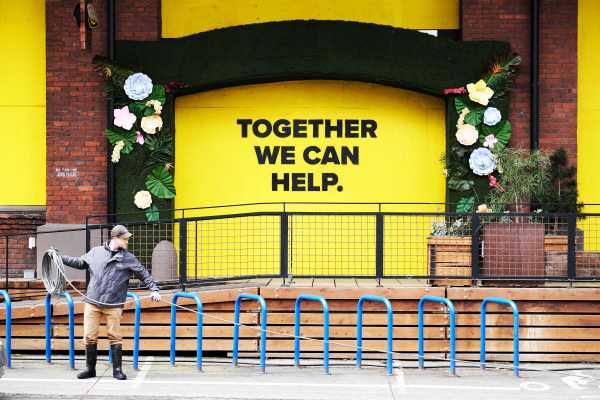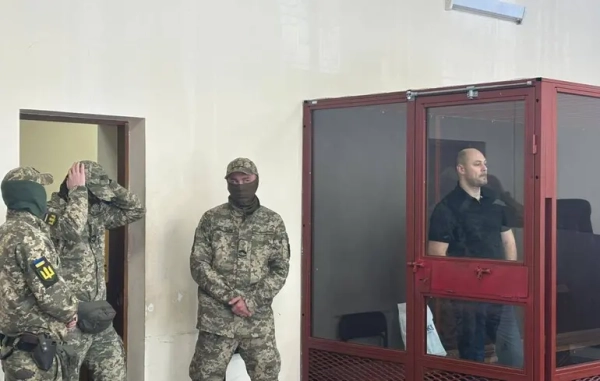
26 million Americans have filed for unemployment benefits as of April 23 as a result of the economic fallout from the coronavirus pandemic. And many of them are discovering what plenty of people already knew: our system is dysfunctional.
Although unemployment programs are run by the states, which means the quality varies from place to place, across the country, the broader social welfare system in this country is generally hard to access: riddled with red tape, and plagued by pointless burdens.
In Florida, for example, the previous Republican governor, Rick Scott, created a congested unemployment system that was nearly impossible to use so that the unemployment numbers would remain artificially low. Other states try to run an efficient system but simply lack the capacity to do so.
Pamela Herd is a public policy professor at Georgetown University and the co-author of Administrative Burdens: Policymaking by Other Means. That book, like much of her research, examines how policy interacts with and reinforces inequality. In a recent op-ed for the New York Times, she argues that the “gap between the promise of public programs and the reality of their design” has been uniquely exposed by this pandemic.
I spoke to Herd by phone about how the system we have is the result of deliberate political choices and why she thinks we need to completely rethink “how we administer the safety net in the United States.”
A lightly edited transcript of our conversation follows.
Sean Illing
In normal times, if you lose your job and need unemployment benefits or food stamps to feed your children, what does the process of getting help look like? How painful is it?
Pamela Herd
One of the challenges is that it all depends on which state you live in. If you live in Mississippi, it might look really different than if you live in New York State or Connecticut or California. And there’s a wide range in terms of eligibility standards and compliance procedures and all the stuff you have to do to access benefits.
So let’s take something like food stamps. If you need food stamps in some states, you might be able to apply online. But it’ll also require you to collect a ton of documentation of things like your earnings or any child support you might be receiving. And if you collect all of this documentation, along with your eligibility forms, then hopefully can upload it online. But the process is extensive and exhausting and at the end of it, you usually have to go through an interview — this is the case in most states, at least. And often you have to go through all of this again every six months or so, depending on where you live.
Thankfully, a lot of this has been relaxed in the wake of this pandemic.
Sean Illing
Which regions of the country, or which states, tend to do this the best? And what do you think accounts for that gap?
Pamela Herd
It’s a complicated question. Some states that have more generous benefits, states we might typically think of as more liberal, are oftentimes easier in terms of these kinds of procedures and protocols. But that’s not strictly true, either.
In California, for example, there are really thorny processes for food stamps because where you enroll and what you need to do varies based on what county you live in, and some counties are much better than others. And then there’s a conservative state like Wisconsin that actually has fairly good administrative processes and it’s not that hard to get benefits.
But the general rule is that more poorly resourced states, like Southern states, just lack the administrative capacity to do this stuff well, even if they want to do it better.
Sean Illing
But if they lack the administrative capacity, aren’t they responsible for that lack? Isn’t it the state governments that choose to gut their public programs?
Pamela Herd
There is absolutely evidence in a lot of these states that it’s by design.
Sean Illing
Apparently the former governor of Florida, Rick Scott, designed their unemployment benefits system so that it would be difficult to access and act as a deterrent for people.
Pamela Herd
Florida is the clearest example of this for sure. And Florida has the resources to do unemployment insurance reasonably well. Because Gov. Scott deliberately wrecked Florida’s program, they’ve actually only processed somewhere between 10 and 15 percent of their applications for unemployment going back into March. They literally just don’t have the capacity to do it, and it’s precisely because it was designed that way.
Sean Illing
The Florida example seems particularly egregious, but is it an outlier? Are there other examples of states hamstringing their own systems?
Pamela Herd
It’s tricky because the reality is that most states just aren’t great at unemployment insurance and some of it has to do with the prevailing logic since the Great Recession in 2008. The guiding principle in most states is that people don’t need to be on unemployment and that there are plenty of jobs available. So they’ve built in processes to try to get people off it quickly. And most states designed their systems with something like 3 or 4 percent unemployment in mind, so they don’t have the capacity to deal with much more than that.
Sean Illing
There’s a line in your New York Times op-ed that captures maybe the fundamental problem here: “For too long, administrative processes have been designed to prevent claimants from incorrectly receiving benefits, rather than ensuring that those in need get help.” That’s an assumption, or a value judgment, built into our model of social welfare that all but guarantees it won’t work well for the people who need it.
Pamela Herd
I’m glad you brought that up, because it’s huge. Most of our social welfare policies are designed in such a way where they’re a lot more concerned about preventing people who aren’t eligible from accessing benefits than ensuring that those who are eligible actually receive them. We’re fixated on fraud and abuse, which is extremely low in social welfare programs — something like 1 to 2 percent of cases. And even then, it’s not what people mean when they think of “fraud and abuse.” It’s mostly people making mistakes because they didn’t understand eligibility rules.
The problem with this unjustified obsession with fraud and abuse is that it means 20 to 30 percent of people are unable to access these programs even when they’re clearly eligible for them, because they’ve created all these administrative burdens designed to target people they don’t want on the programs. So it’s a huge disconnect in terms of trying to meet the broader goals of these programs.
Sean Illing
I want to push a little on this point because I don’t think a lot of people who claim to be concerned about fraud and abuse are really concerned about fraud and abuse. As far as I can tell, this is about trumping us these accusations in order to undermine programs they fundamentally don’t believe in, just as a lot of Republicans disingenuously complain about voting fraud as a cover for depressing voting numbers.
Pamela Herd
You’re right about that. Partly, this is a way conservatives justify the use of administrative burdens. They make these sorts of arguments all the time, whether it’s about voting or social welfare programs. The pretense is always about preventing fraud and abuse. But think about a program like SNAP, or food stamps. The goal of that program was to prevent hunger, was to ensure people had adequate nutrition. If you think about that goal and you realize the way that you’re running that program means that 20 percent of people eligible for that benefit aren’t getting that help that they really need, then you’re fundamentally undermining these programmatic goals. You’re allowing all those people to go hungry.
Sean Illing
Well, that’s partly why I brought this up, because sometimes it’s not clear whether we’re talking about cruelty or incompetence, but the distinction matters —
Pamela Herd
There’s plenty of both. You can look at a lot of the proposals to alter the Medicaid program over the last five years, and it’s very clear that a lot of conservative Republicans pushing those were pushing them knowing that they were extraordinarily burdensome, that they weren’t really encouraging people to work but instead were ensuring that a lot of people who were eligible for benefits would have a harder time accessing them.
Sean Illing
Can you give me an example of what you mean here?
Pamela Herd
Arkansas is a great example of this. [Most people] who lost benefits when they put in place the work requirement lost them because they couldn’t meet the new documentation burdens. And despite clear evidence that the program wasn’t working, they continued to push these burdens. So that’s a case where I think the intentions are pretty clear.
Sean Illing
You’ve called for “a reconfiguration of how we administer the safety net in the United States.” Do you think this pandemic is the catalyst we needed?
Pamela Herd
It’s possible. We’re in a moment where a lot of people, all at once, are trying to seek help from the government and are actually seeing what it’s actually like when you try to do that. People paid into unemployment, they qualify for unemployment, and it’s completely not their fault that they lost their jobs. But we’ve built this system that makes it almost impossible to get help. So maybe that realization will motivate people to push our legislators to do better.
But I think this is also a moment for progressives to rethink their approach to this stuff. Progressives have been far more focused on expanding eligibility, but a lot less attention has been paid to these sorts of administrative burdens that are preventing a lot of people who are eligible for these programs from accessing them.
Sean Illing
What are the simplest, most effective things we could do to improve this process right now for people in need?
Pamela Herd
There are technocratic things like requiring state governments and the federal government to quantify how many people who are eligible for benefits aren’t getting them. Right now they’re required to report on fraud and abuse, but they should also be required to report how many people they’re failing to reach. This would be a good start.
In the short term, if we’re thinking about how to deal with this crisis, we need some quick, easy things the government can do, like increasing SNAP benefits. No one needs to do anything. It just gets loaded on your card and it’s super effective in terms of the return on investment and economic activity.
On the unemployment front, I’d like to see the federal government relax the verification rules for states. We have all these new groups for unemployment, like gig workers, and a lot of these people haven’t even been able to file yet, because states haven’t figured out how to administer that part of the program. And one of the reasons why they’re slow about doing it is because the feds have basically said, “You’re responsible for the verification, and if people get on who shouldn’t get on, you’re going to have to pony up the resources.” So it gives states this really strong incentive to slow-roll this process. But we don’t have time for that right now.
One other thing I’d say is that the process of getting people help is being hindered by these verification requirements that require people to check in every week to say that they’re still unemployed. But that absorbs a ton of staff capacity right now and we could easily stop doing that for at least a couple months. These are small things but they would make a significant difference.
Sourse: vox.com






